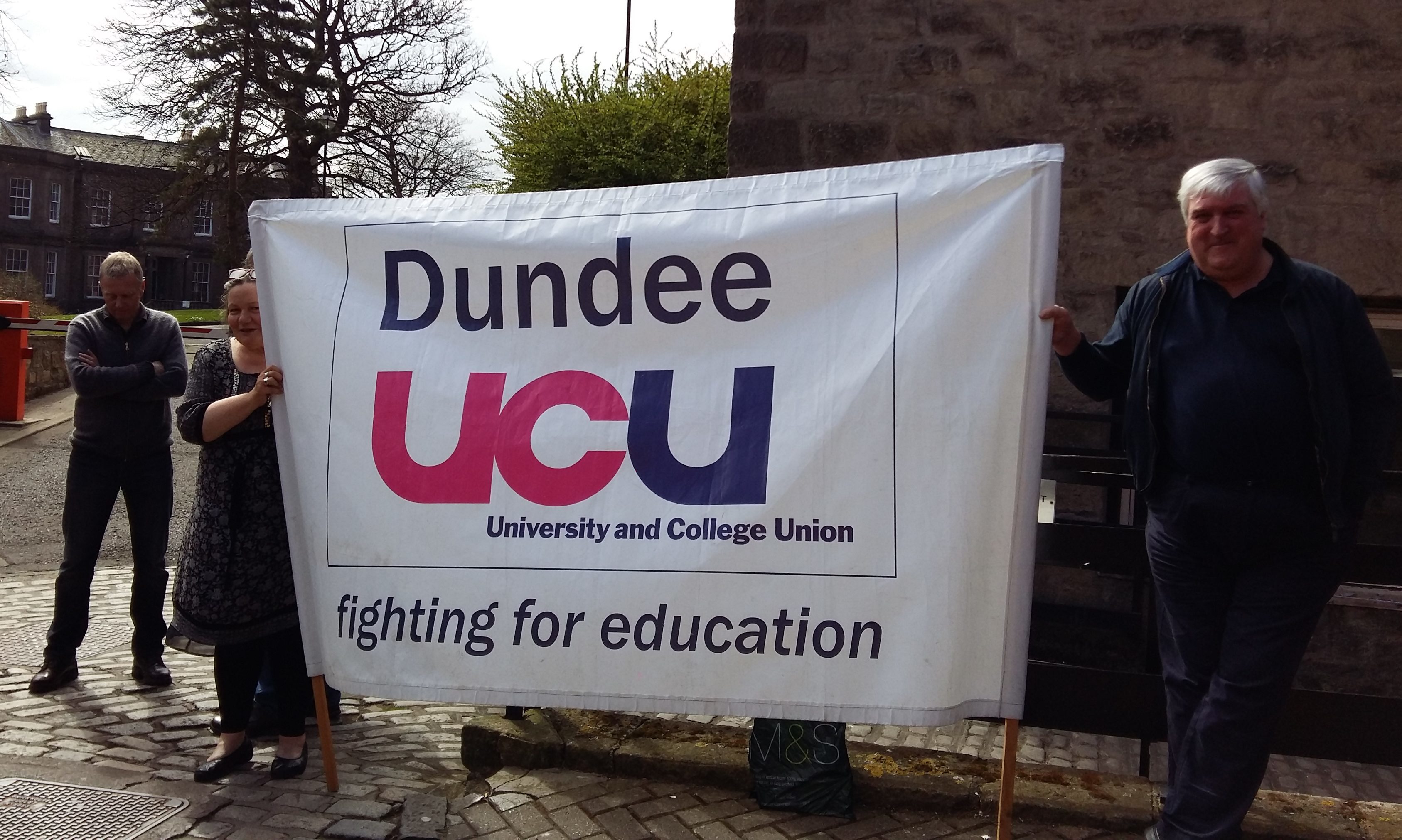Lecturers and professional staff at Dundee University have begun a two walk-out as a pay and conditions dispute escalates.
They are taking part in national industrial action over “pay, the gender pay gap and the “casualisation of the workforce” in higher education.
Strike action was called by the University and College Union (UCU) following a ballot of its members.
The union said the dispute had arisen following an “insulting” pay offer of 1.1% from the employer body, the Universities and Colleges Employers’ Association.
The association has described the walkout as “disappointing given the very good pay offer”, but the UCU believes universities can afford to pay more.
It claims the latest offer does little to address “the real terms pay cut of 14.5% suffered by higher education staff since 2009”.
Talks have since broken down.
Dundee UCU President, Ian Ellis, said that offering employees a 1.1% pay increase while bosses awarded themselves an average increase of 5.1% in 2015-16 demonstrated that “the inequalities of pay are deeply ingrained in the sector”.
He said: “Staff can no longer accept that the sector cannot afford a reasonable increase in pay when principals and vice-chancellors across the UK are receiving increases in their take-home income well above the percentage rise awarded to everyone else.
“It becomes even more unpalatable you’re your take-home income falls consistently in real-terms.
“When part-time members of staff within the sector will be required to work years to earn the average monthly income of a principal or vice-chancellor, it can only reinforce the message that it is the 1% which is valued within the sector.”
#UCU strike today. Great turnout at Dundee University. @UCUScotland pic.twitter.com/fIGRePbiu1
— Socialist Party Scot (@SPS_socialist) May 25, 2016
Lecturers at universities across the UK have launched a 48-hour strike after talks failed to resolve a pay row.
Members of the University and College Union (UCU) will also refuse to work overtime, set additional work, or undertake any voluntary duties like covering timetabled classes for absent colleagues.
If the dispute is not resolved in the coming weeks, members have agreed to further strike action which could affect open days, graduation ceremonies and the clearing process.
The union is also beginning preparations for a boycott of the setting and marking of students’ work to begin in the autumn.
#UCUstrike #ATRiuM @UniSouthWales this morning pic.twitter.com/aOojI76e7f
— Dr Mike Reddy PFHEA (@DoctorMikeReddy) May 25, 2016
Protests are planned around the UK with rallies taking place in Belfast, Birmingham, Brighton, Cambridge, Glasgow, Leeds, Liverpool, London, Manchester, Newcastle and Sheffield.
Unite, which has around 12,000 members in the higher education sector, said it was consulting on the possibility of joining the action. A ballot closes on June 6.
National officer Mike McCartney said: “We are calling on Unite members to reject the offer on the table. They have seen their pay slashed over recent years, while many university bosses are raking in more than the Prime Minister.
And we have a 'dograde' on one of the @ucuedinburgh pickets ? #fairpayinHE pic.twitter.com/E49NN5sX7L
— Fiona Brown (@fionajl) May 25, 2016
“Clearly there is unfairness in the pay system and that hurts our members who are mainly technicians, porters and cleaning staff without whom universities would not function. These are the workers who are the key to providing a good student experience.
“If the results of our consultative ballot are positive, as we expect they will be, then we will then move to a ballot for industrial action.
Early start for @UCUGlasgow at Glasgow University main gate. #fairpayinhe pic.twitter.com/cQHWiyDxPr
— UCU Scotland (@UCUScotland) May 25, 2016
“Sadly, the employers have been totally intransigent and continue to refuse to increase their pay offer. This 1.1% offer is pretty paltry. Higher education staff are dedicated, hard-working professionals, they feel insulted by the offer.
“We are advising our members to support UCU members locally before work, during lunch time and at recognised breaks in their action this week.”










